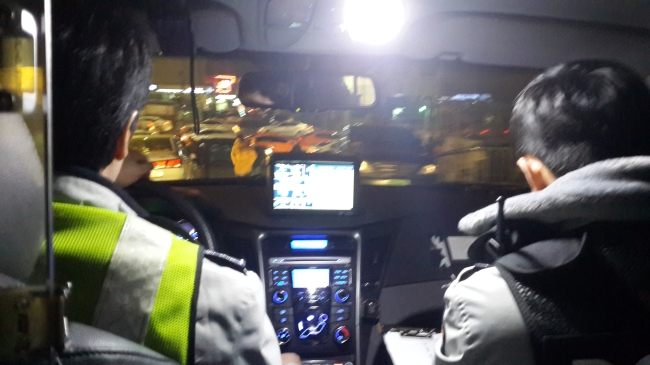
Peaceful silence is broken. The two police officers, Han Ji-hyun and Choi Jong-min turn on their patrol car’s siren and accelerate to an old building near Hongik University as the navigation system directs them to the scene of the crime. They quickly run up to the jewelry shop to see if someone broke into the shop. It was a false alarm.
“When reports come in one after another at night, we are actually thankful for false alarms because then we can quickly move on and handle the next report,” 28-year-old Han said.
The two police officers are one of six night patrol teams at the Hongik police substation, which is in charge of the security around Hongik University in Mapo-gu, Seoul. Four groups, each consisting of six teams, take night shift every four days. Responding to report after report for 12 hours from 8 p.m. is routine for them. Come rain or shine, their duty goes on, and it gets even tougher at the end of the year as they try to maintain public security.
Han and Choi get back to the car and receive the next report. A drunk woman reported a complaint about a bar owner’s manner over the bill. This time, the two public officers are mediators in a trivial dispute. It is only midnight and they have eight more hours to go.
The Hongik office recorded the highest number of calls in the country with about 26,000 out of 2.9 million cases last year. Located near Hongik University, the area is the nightlife hub for youngsters. Incidents happen mostly during the night. While other stations receive about 30 to 40 reports a day on average, Hongik gets around 70 to 80. And that is just at night. As of 12:30 a.m. on Dec. 20, Friday, the number of reports has already exceeded 30.
“I’m expecting over 70 today. It’s not even the beginning. The peak starts at 1 a.m. Plus, it’s the year-end,” said Seo Byung-ha, the chief officer at the Hongik office.
December is one of the busiest times for police officers. Seoul Metropolitan Police Agency annually tightens its crackdown on drunk driving in December around the city. This year, the government started the crackdown one week earlier, running it from the final week of November until January.
The police officers are also deployed to crack down on taxi drivers who preferentially pick up passengers in Seoul. About 100 police officers are placed in five packed spots including Hongik University Station, Jongno and Sinchon, monitoring cabs from midnight to 2 a.m. with 152 Seoul City officials.
Besides their December special duties, the public officers carry out their usual jobs. Dealing with non-criminal issues is one of their main tasks, especially, taking care of the socially vulnerable, including drunk people. Such a job becomes more important around the year-end.
“People tend to have nights out and drink more frequently at the year-end. Whenever we spot drunk people passed out in the streets, we bring them to the station or a hospital in case of emergency. At the station, we wait until they wake up or contact their families if possible,” Seo added.
Even before midnight on one day, a number of drunk people were brought in to the station. One was very drunk, vomiting all over the floor and cursing at the police.
The officers, however, never lost their temper. They put a bucket in front the man, which seemed like part of a well-practiced routine.
“It’s just one part of being a police officer,” Choi Jong-min, a 31-year-old police officer, noted.
Some cases, however, can be difficult even for them, particularly, suicide reports.
Mapodaegyo Bridge, under the Hongik police station’s jurisdiction, is where the most suicides take place among the 14 Hangang River bridges. A total of 108 people have jumped off the bridge in the last five years.
“When a suicide report is received, it’s very tricky. If the person is still present on the bridge, that’s lucky. When we arrive there and see no one on the bridge, it drives us crazy. We have no idea if he or she leaped from the bridge,” Seo said.
Even though unexpected cases keep their lives hectic and take holidays away from them, they say the pride they gain from their work is much greater than the irritation from it.
“I sometimes feel sorry for my family but I’ve been doing this job for more than three decades. Fortunately, my family understands and respects what I do,” the chief said.
“It’s not a perfect job and I’m not completely satisfied with it. But I can surely say that the pride and sense of achievement that I feel for the job is incomparable to the stress and annoyance it brings,” said Han, who started the job three years ago.
By Lee Hyun-jeong (rene@heraldcorp.com)


![[Exclusive] Korean military set to ban iPhones over 'security' concerns](http://res.heraldm.com/phpwas/restmb_idxmake.php?idx=644&simg=/content/image/2024/04/23/20240423050599_0.jpg&u=20240423183955)




![[Pressure points] Leggings in public: Fashion statement or social faux pas?](http://res.heraldm.com/phpwas/restmb_idxmake.php?idx=644&simg=/content/image/2024/04/23/20240423050669_0.jpg&u=)










